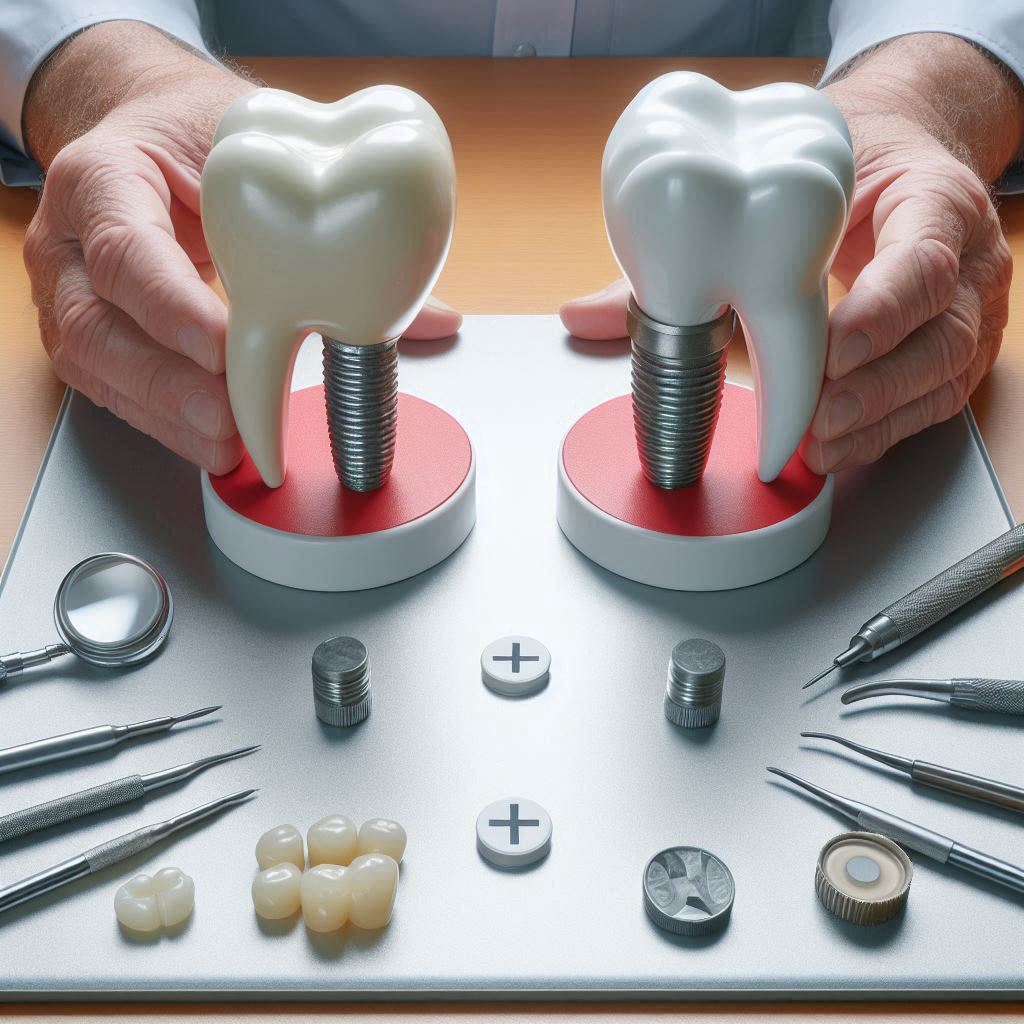Introduction
Oral health is crucial to overall well-being, self-esteem, and quality of life. Losing teeth due to trauma, decay, or aging is not only a cosmetic issue but also a functional one, affecting speech, nutrition, and comfort. For individuals with missing teeth, restorative options such as dental implants and dentures can help restore both appearance and function.
Although both dental implants and dentures aim to replace missing teeth, they vary significantly in terms of approach, cost, durability, and maintenance. Dental implants provide a permanent, stable solution by surgically placing titanium posts into the jawbone, which fuse over time to hold artificial teeth. They offer a natural appearance and function but come with a higher initial cost and a more invasive procedure.
Dentures, on the other hand, are removable prosthetics that can be customized to fit the patient’s mouth. They are less expensive and easier to place but may require more maintenance, including adjustments and relining. This comprehensive guide will examine the pros and cons of both options, exploring their procedures, costs, effectiveness, and long-term care, helping you make an informed decision regarding your dental restoration needs.
What Are Dental Implants?
Dental implants are an advanced and permanent solution to replace missing teeth. These implants are small titanium posts or screws that are surgically placed into the jawbone, acting as a sturdy foundation for artificial teeth. The titanium post fuses with the bone over time in a process called osseointegration, making it a durable and long-lasting solution.
The Procedure for Dental Implants:
- Initial Consultation: The dentist evaluates the overall health of the patient’s gums, jawbone, and teeth. X-rays and 3D imaging may be performed to assess the structure of the jawbone and determine the precise location for the implant.
- Surgical Placement of Implant: Under local anesthesia, the titanium implant is placed into the jawbone. After the procedure, patients may experience some swelling and discomfort, but these side effects typically subside within a few days.
- Osseointegration: Over the next few months, the titanium implant fuses with the bone in a process called osseointegration. This ensures the implant becomes firmly anchored in the jaw, making it a permanent fixture.
- Abutment and Crown Placement: Once the implant has integrated with the bone, a custom-made abutment is attached to the implant, followed by a crown, bridge, or denture, depending on the patient’s needs. This step finalizes the restoration process.
- Follow-up Appointments: Periodic visits to the dentist are necessary to ensure the implant is functioning properly and to perform any maintenance required.
Types of Dental Implants:
- Endosteal Implants: The most common type of dental implant, placed directly into the jawbone. They can support a single crown or multiple teeth.
- Subperiosteal Implants: Used for patients who lack sufficient bone height. These implants are placed on top of the jawbone, under the gum tissue.
- Zygomatic Implants: For patients who have severe bone loss in the upper jaw, these implants are anchored in the cheekbone (zygoma), rather than the jawbone.
What Are Dentures?
Dentures are removable prosthetic devices designed to replace missing teeth and the surrounding tissues. They are custom-made to fit the patient’s mouth and come in two primary types: full dentures and partial dentures.
Full Dentures:
Full dentures are intended for individuals who have lost all of their teeth in one or both arches of the mouth. These dentures cover the entire upper or lower jaw and are designed to rest securely on the gums. Crafted from a combination of acrylic resin and sometimes metal, full dentures aim to restore the appearance and function of natural teeth. They are designed to closely mimic the shape and color of natural teeth, providing an aesthetically pleasing result. Full dentures help improve the ability to chew and speak, which may be compromised when all teeth are lost. They also offer support to the facial muscles, preventing sagging or a sunken appearance.
Partial Dentures:
Partial dentures are used when some natural teeth remain in the mouth. These dentures are designed to fill in the gaps created by missing teeth while allowing the remaining natural teeth to stay intact. Partial dentures are held in place by clasps that attach to existing teeth or through precision attachments that offer a more discreet and secure fit. They can be made from a combination of acrylic, metal, and sometimes flexible materials, offering both durability and comfort. Partial dentures not only improve the aesthetics of the smile but also help in restoring the function of chewing and speaking. Additionally, partial dentures prevent the remaining teeth from shifting and becoming misaligned.
Both full and partial dentures can be custom-designed for a precise fit and tailored to each patient’s unique needs, ensuring optimal comfort and functionality.
The Procedure for Dentures:
- Initial Consultation: The dentist takes impressions of the patient’s mouth to design the dentures. X-rays and other imaging techniques may be used to assess the remaining teeth and gums.
- Creating the Dentures: Once the impressions are taken, a dental laboratory creates the custom dentures. This process can take several weeks, and patients may be given temporary dentures to wear during this time.
- Fitting the Dentures: After the dentures are created, they are fitted into the patient’s mouth. Adjustments are made to ensure comfort and proper alignment.
- Follow-Up Appointments: Denture wearers are encouraged to return for follow-up visits to check the fit and address any issues that arise. Dentures may require relining or adjustments over time.
The Pros and Cons of Dental Implants
Pros of Dental Implants:
- Longevity and Durability: Dental implants are designed to last a lifetime with proper care. The materials used, such as titanium, are incredibly strong and durable. Most implants last 20 years or more, unlike dentures, which may need to be replaced every 5 to 10 years.
- Natural Appearance and Function: Implants closely resemble natural teeth, both in terms of aesthetics and function. The crowns placed on implants can be color-matched to existing teeth, providing a seamless and natural look.
- Bone Health: Implants help preserve the jawbone by stimulating it, preventing bone loss that typically occurs after tooth loss. Dentures, on the other hand, do not provide this benefit, which can result in a sunken facial appearance over time.
- Improved Comfort: Unlike dentures, which can shift and cause irritation, dental implants are fixed in place, making them more comfortable and secure. They do not move around in the mouth, providing better speech and eating function.
- Preservation of Adjacent Teeth: Unlike bridges, which require reshaping of adjacent teeth, dental implants do not affect the neighboring teeth. This allows the surrounding teeth to remain intact and healthy.
- No Need for Removal: Implants are permanent, so they do not need to be removed for cleaning or maintenance, unlike dentures that require daily removal and soaking.
- Improved Confidence: Dental implants provide a long-lasting, natural solution, which can improve a patient’s confidence and self-esteem compared to removable dentures.
Cons of Dental Implants:
- High Initial Cost: Dental implants are significantly more expensive than dentures. The cost includes the implant placement surgery, abutment, crown, and follow-up care. Some patients may not be able to afford the upfront cost, though financing options are available.
- Surgical Procedure: Getting dental implants requires surgery, which comes with inherent risks, including infection, nerve damage, or implant failure.
- Healing Time: Osseointegration, the process by which the implant fuses with the jawbone, can take several months. During this time, patients may need to wear temporary restorations.
- Not Suitable for All Patients: Some individuals may not be candidates for implants due to insufficient bone density, certain medical conditions, or poor oral health. In these cases, additional procedures, such as bone grafting, may be necessary.
- Potential Complications: Although rare, dental implants can fail due to infection, improper healing, or mechanical issues with the implant. Regular maintenance is essential to ensure the success of the implant.
The Pros and Cons of Dentures
Pros of Dentures:
- Affordable: Dentures are much more affordable upfront than dental implants. For patients on a budget or those who do not have sufficient bone density for implants, dentures can be an effective solution.
- Non-Invasive: Unlike dental implants, dentures do not require surgery, making them a less invasive option. For patients who are not suitable candidates for implants due to health conditions, dentures provide a viable alternative.
- Quick Solution: Dentures can be made relatively quickly, often within a few weeks. Patients who need immediate tooth replacement can opt for immediate dentures, which can be placed the same day as tooth extraction.
- Customizable: Dentures are highly customizable to suit individual needs. They can be designed in various shapes, sizes, and materials to match a patient’s natural appearance.
- Easy to Adjust: Dentures can be easily adjusted or relined as needed, especially if the fit becomes loose over time. This makes them more adaptable to changes in the mouth structure, such as gum recession or bone loss.
- Removable: For patients who prefer a non-permanent solution, dentures are removable, making them easy to clean and maintain.
Cons of Dentures:
- Less Comfortable: Dentures may cause irritation or discomfort in the gums, especially if they do not fit properly. They can also slip or shift during speaking or eating, leading to potential embarrassment.
- Bone Loss: Unlike dental implants, dentures do not stimulate the jawbone, which can lead to bone resorption over time. This may change the shape of the face, leading to a sunken appearance.
- Maintenance: Dentures require daily cleaning, soaking, and periodic adjustments. They can also become stained, which requires additional cleaning or professional maintenance.
- Shorter Lifespan: Dentures typically need to be replaced every 5 to 10 years due to wear and tear. They may also need to be relined or adjusted regularly to ensure a proper fit.
- Limited Functionality: Dentures do not offer the same biting force as natural teeth or implants. They may limit the ability to eat certain foods, especially hard or sticky items.
- Speech Issues: Some individuals may experience difficulty speaking clearly while wearing dentures, particularly if the dentures do not fit properly.
Factors to Consider When Choosing Between Dental Implants and Dentures
When deciding between dental implants and dentures, several factors should be considered:
- Budget: Dental implants can be more expensive than dentures, so cost is a major factor for many patients. Dentures provide a more affordable initial solution but may require more maintenance and eventual replacement.
- Health: Your overall health and oral health play a crucial role in determining which option is best. For patients with sufficient bone density and good oral health, implants are typically the better choice. However, for patients with significant bone loss, dentures may be more appropriate.
- Desired Outcomes: If you are looking for a long-term, permanent solution that mimics the function of natural teeth, dental implants may be the best option. However, if you prefer a less invasive and more affordable solution, dentures are a good alternative.
- Aesthetic Considerations: Both implants and dentures can provide excellent aesthetic results, but implants tend to look and feel more like natural teeth due to their fixed nature.
- Maintenance: Consider the level of maintenance you’re willing to commit to. Dental implants are low-maintenance and do not require removal, while dentures need to be cleaned, soaked, and adjusted regularly.
- Lifestyle: If you value convenience and stability in your oral restoration, dental implants are ideal. Dentures are more suited to individuals who may want a removable option with fewer long-term commitments.
Conclusion
Both dental implants and dentures offer distinct benefits and drawbacks, depending on an individual’s specific needs, preferences, and financial situation. Dental implants provide a permanent, durable, and natural-looking solution for replacing missing teeth. They integrate with the jawbone, offering a stable foundation that mimics the function of real teeth. However, they come with a higher upfront cost, involve a surgical procedure, and require a longer recovery period due to the time needed for the implants to fuse with the bone.
On the other hand, dentures are a more affordable option and are non-invasive, offering a quicker and less complex solution for tooth replacement. They can be made in full or partial forms, depending on the number of missing teeth. Dentures are removable, which makes them easier to clean, and they may be ideal for those who prefer a less permanent solution. However, dentures require more frequent maintenance, such as relining or adjustments over time, and may not provide the same level of comfort, stability, or chewing function as implants. They can sometimes cause irritation or discomfort, particularly if they do not fit properly.
Ultimately, the decision between dental implants and dentures depends on various factors, including the patient’s oral health, aesthetic goals, and budget. For those looking for a long-term, natural solution, implants may be the better choice, but for those seeking an affordable, non-invasive option, dentures could be more suitable. It’s essential to consult with a dental professional to evaluate your individual needs and determine which option will best serve you in the long run.
SOURCES
American Dental Association. 2019. Dental implants: What you need to know. American Dental Association.
Burch, J. R., & Smith, M. C. 2017. The impact of dental implants on oral health and quality of life. Journal of Clinical Dentistry, 58(4), 233-245.
Chadwick, J. M., Taylor, R. W., & Roberts, C. R. 2018. Long-term effectiveness of dental implants versus dentures: A comprehensive review. International Journal of Prosthodontics, 31(2), 106-118.
Cohen, S. G., & Wilke, M. L. 2020. Factors influencing the success rate of dental implants. Journal of Periodontology, 91(6), 753-762.
Gorlin, R. J., Goldman, H. M., & Tucker, M. A. 2019. Oral and maxillofacial surgery: Diagnosis and management. Elsevier.
Harris, S. M., Blackwell, S. D., & Jones, A. T. 2016. Comparing the clinical outcomes of dental implants and removable dentures. Dental Materials Journal, 35(7), 882-893.
Kumar, P. S., Patel, R. S., & Sivapathasundaram, B. 2017. Overview of dental implant procedures and techniques. Journal of Prosthetic Dentistry, 117(3), 342-348.
López-Muñoz, F., Sánchez, M. Á., & Gómez-Benito, J. 2021. The evolution and future of dental implants in prosthetic dentistry. European Journal of Prosthodontics, 22(3), 179-187.
Mayer, P., Scholz, M. C., & Wolf, J. H. 2018. Clinical success of dental implants versus conventional dentures in elderly populations. Journal of Geriatric Dentistry, 45(5), 45-55.
Miller, R. A., & Finch, W. P. 2020. Effectiveness of dental implants for tooth replacement: A systematic review of the literature. International Journal of Oral and Maxillofacial Implants, 35(3), 350-359.
Nicolau, C. P., & Santos, M. P. 2019. The long-term success rates of implants compared to traditional dentures: A retrospective study. Journal of Prosthetic Oral Surgery, 68(1), 100-112.
Schmidt, S. E., Willemsen, J. E., & Van Hout, R. H. 2021. The biomechanics of dental implants: A comparison with natural teeth and removable dentures. Journal of Biomechanics, 58(4), 481-488.
Stallard, J. C., Meier, H. W., & Willis, M. J. 2018. Denture-related complications and patient satisfaction: An analysis of new dental trends. American Journal of Dentistry, 31(2), 125-134.
Williams, G. P., Johnson, R. P., & Stewart, C. H. 2020. The evolution of dental prosthetics: From dentures to implants. Dental Research Journal, 49(1), 31-40.
Zhou, Y., & Liu, H. 2017. Cost-benefit analysis of dental implants versus dentures: What is more cost-effective for patients? Journal of Dental Economics, 15(4), 22-29.
HISTORY
Current Version
February 8, 2025
Written By:
SUMMIYAH MAHMOOD




